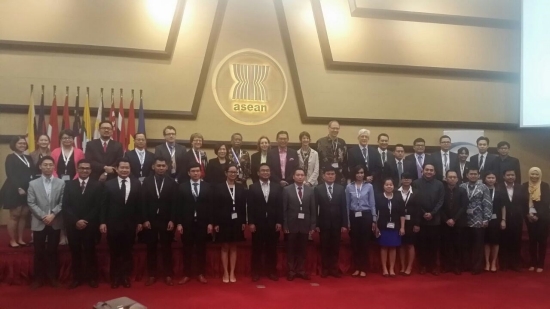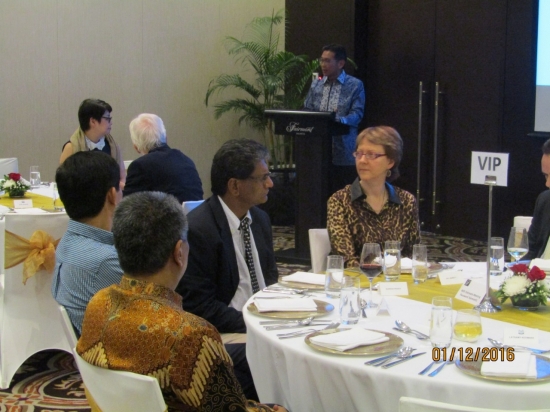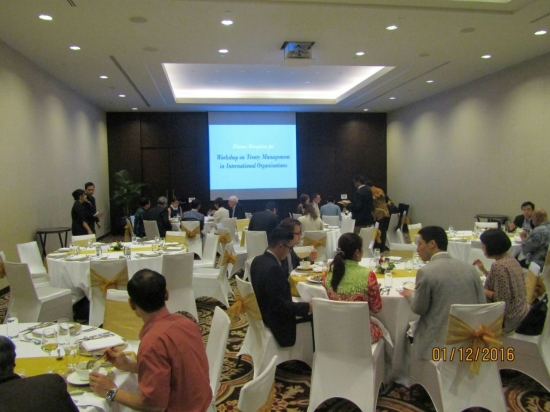02 Dec 2016




09-Dec-2016
Source: ASEAN Secretariat News
Workshop on Treaty Management in International Organisations: Lessons Learnt and ASEAN Practice, 2 Dec 2016
The “Workshop on Treaty Management in International Organisations: Lessons Learnt and ASEAN Practice” was held in Jakarta on 2 December 2016. Aimed at identifying best practices in ASEAN treaty management and discussing the way forward, the Workshop was organised by the ASEAN Secretariat and the Centre for International Law of the National University of Singapore (CIL) and supported by Deutsche Gesselschaft für Internationale Zusammenarbeit (GIZ). The Workshop was attended by participants from the 10 ASEAN Member States and the ASEAN Secretariat. Singapore’s Permanent Representative to ASEAN Tan Hung Seng also hosted the participants to a welcome dinner on 1 December 2016 and delivered some opening remarks at the Workshop on 2 December 2016. The closing remarks were delivered by Director of the Centre for International Law Professor, Lucy Reed and First Secretary ASEAN Affairs of the Embassy of the Federal Republic of Germany, Timo Goosmann. PR Tan’s opening remarks are appended:
Professor Lucy Reed, Director of the Centre for International Law
DSG Mochtan
Fellow Excellencies
Distinguished guests, Ladies and Gentlemen
First of all, I wish to warmly welcome all the participants and speakers to the ASEAN Secretariat in Jakarta and to the Workshop on Treaty Management in International Organisations: Lessons Learnt and ASEAN Practice.
Today’s Workshop is important and timely. It is important because the entry into force of the ASEAN Charter in 2008 represented a milestone in ASEAN’s evolution towards a rules-based organisation. Just as individuals and societies need rules of behaviour to regulate our actions, nation-states depend on international laws to govern inter-state relations and preserve international order. Otherwise, “might will become right”, which will be disastrous. It will destroy the peace and security that has underpinned our region’s growth and development over the last 50 plus years.
At last count, ASEAN has concluded approximately 220 legally binding instruments. 15% of the instruments are under the political-security pillar, 4% are under the socio-cultural pillar; and the largest portion – about 80% – is under the economic pillar. These agreements and treaties cover diverse areas that range from trade, services and investment, to trans-boundary haze pollution. With ASEAN’s continued integration efforts, coupled with growing interest from external parties in engaging with us, the number of treaties and other instruments signed by ASEAN Member States will only increase. Since 2008, when the ASEAN Charter entered into force, ASEAN has concluded over 150 legal instruments. Just to name a few key instruments, they include the Agreement between the Government of the Republic of Indonesia and ASEAN on Hosting and Granting Privileges and Immunities to the ASEAN Secretariat, the ASEAN Convention on Counter Terrorism, ASEAN Comprehensive Investment Agreement and ASEAN Agreement on Disaster Management and Emergency Response. Following the establishment of the ASEAN Community in 2015, ASEAN continues to work towards finalising important agreements such as the Protocol on the Legal Framework to Implement the ASEAN Single Window, the protocols to implement the different packages of services commitments under the ASEAN Framework Agreement on Services, the Regional Comprehensive Economic Partnership (RCEP) and other Free Trade Agreements with our external partners.
A key challenge facing ASEAN’s integration efforts is that all 10 ASEAN Member States have different legal traditions, regulatory systems, and political systems. Consequently, the time taken by ASEAN Member States to ratify these agreements and instruments can vary considerably. While our objective is not to create a homogeneous legal system for the region, it is critically important that the all 10 ASEAN Member States, along with the ASEAN Secretariat, improve and strengthen their treaty management capacities.
Hence, today’s workshop is a timely opportunity for us to exchange experiences on treaties management and various best practices. Good treaty practices are important for the clarity of states’ international legal relations, and their ability to comply with international law. ASEC also plays a crucial role in the management of treaties, as ASEAN Member States depend on ASEC to track, and provide important information on the various treaties that ASEAN has concluded. It is my hope that this workshop will, in a small but important way, contribute to ASEAN’s Community-building efforts.
Before I conclude my remarks, I would like to take this opportunity to express my appreciation to Germany for supporting this important initiative today.
I would also like to thank the Centre for International Law (CIL) from the National University of Singapore for organising this Workshop. CIL is a close friend of ASEAN, and has undertaken many initiatives that have contributed to ASEAN’s integration through the years. These include lectures and workshops on the ASEAN Charter, as well as its ASEAN Integration Through Law Project.
Today’s Workshop is the second workshop on treaties management that CIL has conducted for ASEAN. The first was held in January 2012, when CIL worked together with the British Institute of International and Comparative Law to jointly conduct a Workshop on Treaty Law and Practice for ASEAN officials and ASEC staff. That workshop focused on the operational aspects of treaty practice which is undertaken by treaty offices all over the world, and presented a list of recommendations for ASEAN Member States and ASEC to consider.
Today’s Workshop seeks to address issues such as ASEC’s role in managing treaties and other legal instruments, as well as the internal process of ASEAN Member States to ratify treaties and legal instruments. I am confident that this Workshop will make an important contribution to enhance the capacity of ASEAN Member States in treaty management. I wish you all a fruitful Workshop.
Thank you.